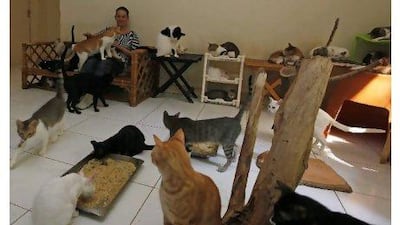DUBAI // On the outside, Petra Mueller's two-storey villa in a quiet, leafy section of Umm Suqeim looks like any other elegant house in the neighbourhood.
But once visitors pass the bougainvillea-lined garden wall and step inside the spacious property, they soon realise that this home is unlike any other.
As Ms Mueller enters her living room, more than 30 cats are lazing around. When she sits down on an old sofa - one of the few pieces of furniture in the room - the furry group stirs.
The cats crowd around their owner. Two compete for a spot on her lap.
The spacious rooms, aside from one bedroom, are home to a total of 120 friendly cats.
The felines are divided into groups, depending on their gender, how they ended up in the house, and whether they are supposed to produce offspring. Outside the house, for good measure, there are also 11 dogs.
"When people come here, they say I have this nice big villa and I tell them come inside," Ms Mueller said.
But even though she has a full-time cleaner, she cannot entertain guests inside the home. Carpets were scratched up long ago, and there are only a few pieces of furniture remaining.
"My friends say I am crazy," she says with a smile.
Yet the 60-year-old German, who lost her only daughter in a car accident in 1977, insists she is doing the right thing.
She wakes up about 5.30 each morning to check on the cats and give them medicine and food - about six kilograms of dry pellets. At about 6pm, the animals receive another meal - home-cooked biryani made with 5kgs of rice, as well as chicken, lamb or fish.
In the early 2000s, officials from the World Cat Federation on a visit to Dubai noticed that many of the cats in the area were unlike anything they had seen before. They suspected that the animals, who had long ears and legs, and short fur, were a distinct breed.
Proving this required breeding the animals for six generations to ensure that features thought to be specific to the breed remained unaltered - an effort with which Ms Mueller helped. She started breeding the cats, neutering them only once a litter of offspring had been produced.
In 2008, the Arabian Mau - which comprises most of the cats in Ms Mueller's home - was recognised as a distinct breed.
As president of the Middle East Cat Society, Ms Mueller is hoping to set up a re-housing and care centre for the breed, though she currently lacks the funds.
Also in 2008, Ms Mueller was diagnosed with advanced osteoporosis, and underwent a double hip replacement. More recently, the former dancer and choreographer discovered that the disease had spread to her spine, limiting her ability to care of her cats.
"If I make a wrong movement, it would mean a wheelchair," said Ms Mueller, who was once famous in her native Germany, having appeared in music videos, TV shows and in the film Le Dernier Combass (The Last Battle) by the French director, Luc Besson.
Her disease, as well as mounting financial troubles, have persuaded her to place some of the cats in other homes. She had even more animals - 180 - until she started to rehome them this summer.
"I want to keep 30," she said. "This means I have 83 left to home."
More pressing are her financial difficulties. Ms Mueller is facing eviction from her Dh175,000-a-year villa. She has not paid any rent this year. Her landlord, she says, does not mind the animals and had been patiently waiting for payment since the beginning of this year. But now, he is demanding his rent and has decided to have her evicted. He could not be reached for comment.
Ms Mueller, who works as a freelance marketing and public relations consultant, said her medical condition worsened last December and she had to refuse jobs. She also has rising medical costs.
"My landlord is great to find someone like him is very difficult," she said. "This is why I am so sad that I cannot give him the money. I hope I can make some cash fast and he changes his mind."
Ms Mueller plans to ask for donations so she can pay her rent. Her concern is that no landlord in Dubai will agree to take on a tenant with so many cats.
"I did this up to now from my own pocket, and now that I am sick I cannot do this any more without help," she says. "This money would not go to me, it goes to the landlord so he can let the animals stay."
Yet even in the middle of her strife, Ms Mueller is composed as she speaks, smiling often.
"I discovered that everything happening to me was for a reason," she said. "Why, you discover later."

